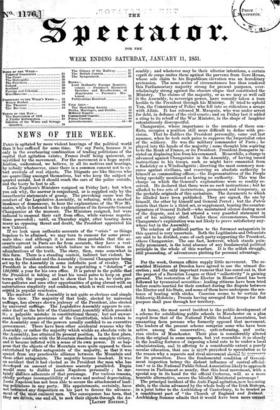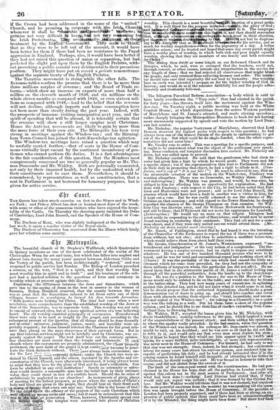At home, the most novel incident is the public development
of a scheme for establishing public schools in Manchester on a plan copied from that of the National Public School Association, but emanating from persons who formerly opposed that movement. The leaders of the present scheme comprise some who have been active among the conservative, anti-reforming, and secta- rian circles of Manchester. Their plan is considerably altered from the original in some respects, but yet resembles it so closely in the leading features of imposing a local rate to be under a local administration, and in offering to a considerable extent a purely secular education, that one is 11-12ell provoked to speculation as to the reason why a separate and rival movement shOuiti
for its promotion. Does the fundamental condition of Govern- ment inspection betray the distant influence of central official- ism? or is the National Public School Association likely to approach Success in Parliament so nearly, that this local movement, with a special sop in its hand for the official Cerberus, will, as a more bearable alternative, secure the blissful Ministerial patronage?
The principal incident of the Anti-Papal agitation, now becoming stale, is the claim advanced by the whole body of the Irish Bishops, in a joint letter to the Archbishop of Canterbury, to be treated as a constituent part of "the Church of England and /talon& Archbishop Sumner admits that it would have been more netted
if the Crown had been addressed in the name of the "united" Church, and he promises ta col:perste with e Irish,. Chun
ft • whenever it shall be "41saiiirble nostitract " litottoriso ; prdmise not very difficult rt. keepot lini not - . remitting the Irish Protestants+. Taw areolia401011E11.1844ail 44.1 th treatment by the EngliskGovernment. T y seem to -.thin that as they were to be left out of the account, it would have been better for them if there had been no resistance to the Papal aggression in England. Perhaps, also, it would have been better if they had not raised this question of lin* or . separation; but had, pocketed the slight put upon them by the English Prelates, with out provoking a public scandal very detrimental to their precarious position; They might have ,put .on. record a private remonstrance against.the separate treaty of the EnglisliPtelates. The Taxation movement- is rising while the- other falls. The. Revenue-tables eonfmn the -promise that there is to be-more than tines- millions- surplus of- revenue.; anr1 the Board of Tnule.re- turns,—which ;show-an increase -on exports of more than- half . a million on the eleventh month of 1850; and six millions -on-the. whole eleven months as compared: with 1849, or even sixteen mil- lions -as compared with 1848;—lead to the belief that the revenue will not decline, although. imports and .home consumption have not been more than steady during the past year. Indeed, with the prospects of immense visiting immigration next year, and 'the spirit 'of spending that will be abroad, it is tolerably, certain that' the. revenue -will; show a - still- larger surplus next Christmas.. Hence the Anti-tax movements are likely -to gain by more than the mere foree- of their own stir. The Metropolis his been very strong, in meetings against the Window-tax ; and the-Birming- ham Town-Council has joined the Anti-Knowledge-tax agitation.
The Window-tax meetings have raised a question which may
be usefully carried further' —that of seats in the-House of Com- mons -virtually kept 'vacant by the continued incumbency of gee-. tlemen who cannot perform the duties. It is a fact advantageous to the fair consideration of -this question, that the Members most conspicuously concerned are two so generally popular as -Mr. Tho- mas Buncombe and Mr. Wakley. Both are personally exonerated, not only by their impaired health, but by the undoubted wish- of their constituents not to oust. them. Nevertheless it should be remembered; by representatives as well as constituencies, that a seat in Parliament is not bestowed for-honorary purposes, but is given. for active service.



























